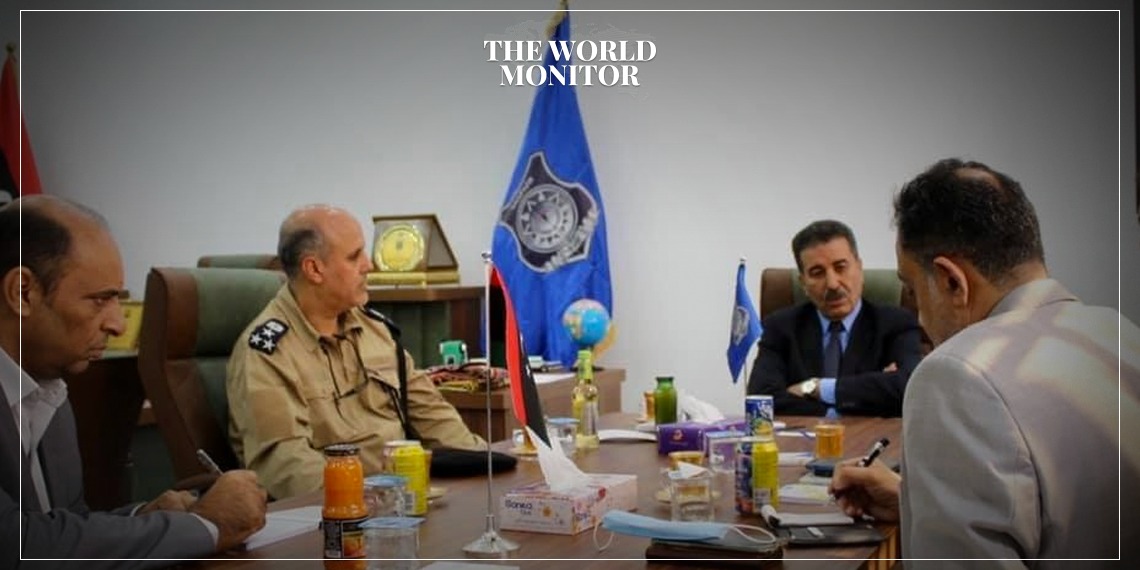Libyan Interior Minister of the Government Appointed by the House of Representatives, Major General Essam Abu Zreibah, discussed on Monday a security plan to combat irregular migration and smuggling, and to secure the Libyan coast.
This was during a meeting with the Head of the Anti-Illegal Immigration Agency, Major General Nouri Al-Saadi, the Director-General of Coastal Security, Major General Emhamed Abdelkarim Mohammed, the Director-General of Inspection and Follow-Up, Major General Sharif Ismail Quwider, and the heads of the Coastal Security branches in the eastern region.
Security Plan for the Year 2024
The meeting focused on discussing a security plan set by the Minister of Interior for the year 2024 with the aim of combating irregular migration and smuggling, the expected security challenges in the future, identifying the obstacles that impede security efforts, and finding appropriate solutions for them, according to a statement published by the Security Media Office on the ministry’s Facebook page.
The statement added that the meeting discussed the necessity of securing the Libyan coast, establishing strategic security points, and linking the Coastal Security branches with the main control room, in addition to discussing the role of Coastal Security in ports and coastal areas.
The attendees reviewed the cooperation mechanism between the Anti-Illegal Immigration Agency and the Coastal Security administration, and the role of the Desert Patrols Administration in combating unlawful activities, where it was emphasized on the necessity of providing the necessary support to Coastal Security to ensure the efficient execution of its tasks.
At the end of the meeting, Abu Zreibah affirmed that the main goal in the year 2024 is to create a sustainable security environment, directing to renew surveillance at the outlets and work closely to execute the security plan efficiently and professionally.
Illegal immigration from Libya has a complex history, influenced by various factors such as the country’s political and economic changes. Initially, before the discovery of oil, Libya was one of the poorest countries in Africa, leading to more emigration than immigration. However, following the discovery of oil and the consequent economic boost, Libya experienced an influx of immigrants, both legal and illegal, from neighboring countries and beyond. This was particularly true after Libya adopted an open-door policy for immigrants from the Arab world towards the end of 1969. By the end of the 1990s, Libya’s foreign policy shifted from pan-Arab to pan-African unity, further influencing immigration patterns.
The Arab Spring in 2011 significantly impacted illegal migration in Libya. The uprising led to a large-scale exodus of foreigners, including migrants who either chose to stay in Libya or were unable to return to their home countries. The post-revolution period saw Libya becoming a major transit country for illegal migrants to Europe, partly due to EU treaties with other Mediterranean countries to curb illegal migration and Gadhafi’s political maneuvering using migration as pressure on European countries.
The current situation in Libya poses significant risks to migrants. The UN Human Rights Office reports that migrants in Libya face the risk of arbitrary or collective expulsion without assessment of their individual circumstances or protection needs. Migrants are frequently denied access to legal assistance and other critical procedural safeguards. Thousands of migrants are arrested each year and placed in detention centers where they suffer a range of human rights violations, including torture, sexual violence, and enforced disappearance. Despite these challenges, Libya continues to attract large numbers of migrants who come for work or to transit to Europe, with remittances playing a critical role in the economies of many households in countries ranging from Chad to Egypt to Sudan.






